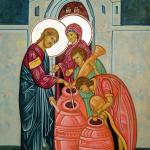At the beginning of a recent episode of “Consider This,” NPR’s daily afternoon news podcast, Rev. Jim Wallis, the chair of the Faith and Justice Center at Georgetown University, commented on the fact that many of those who participated in the January 6th, 2021 Capitol insurrection began their activities with a prayer thanking God for “gracing us with this opportunity to stand up for our God-given unalienable rights.” While part of the motivation for the insurrectionists that day was the “Big Lie” that the November 2020 election had been stolen, Wallis focused his attention elsewhere.
The bigger lie in whose name this was done was racism in the ideology of white Christian nationalism. We are made in God’s image and likeness. And to commit racism like that is really an assault on the image of God. It’s a theological issue more than a political one. It’s a theological offense to God. It’s a sacrilege really.
Later in the podcast, Wallis continued:
To practice voter suppression and deny the vote to even one person because of the color of their skin is again throwing away the image of God . . . I want to suggest that all our churches should preach voting rights not just as a political issue but as a faith issue – a test of our faith, a test of whether we believe or not in the image of God.
Another guest on the same episode of “Consider This” was Georgia Senator Raphael
Warnock, who is also the senior pastor at Ebenezer Baptist Church in Atlanta where Dr. Martin Luther King, Jr. was once pastor. Warnock has long emphasized the spiritual foundations of democracy.
I have often said that democracy in a real sense is the political enactment of a spiritual idea. There is no question that voting rights is a moral issue. I have often said that democracy in a real sense is the political enactment of a spiritual idea, this notion that each of us is a child of God and therefore we ought to have a vote and a voice in the direction of our country and our destiny within it. And so when we defend voting rights, this is much larger than a political exercise for me. It’s really about the dignity of everybody’s humanity and our ability to build a future that embraces all of us.
The commitment of white evangelical Christians to use their faith in attempts to undermine democracy, to justify resistance to Covid-19 vaccines, and to erase the distinction between Christianity and libertarianism is, in the words of Michael Gerson, “heresy compounded by lunacy.” And it continues, threatening not only our democracy, but also the very values and principles within which the Christian faith is deeply rooted.
In a recent Washington Post op-ed Jennifer Rubin, who for years has been one of the token conservative voices on the WaPo editorial staff, wrote that “Much has been written about White evangelicals’ central role in the fraying of democracy. More attention, however, should be paid to the damage the political movement has inflicted on religion itself.” It very well might be, Rubin argues, that the descent of white evangelical Christians into MAGA politics, conspiracy theories, and cult worship has done great, perhaps permanent damage to many of the basic values once considered foundationally important to the faith they profess. A few observations:
- Disdain for the welfare of anyone other than oneself and one’s own perceived “freedoms” is a mockery of the Gospel call to care for the widowed, orphans, homeless, disenfranchised, and most vulnerable among us.
- The teachings of Jesus, crystallized in the Sermon on the Mount and its call to love your neighbor as yourself, are now treated essentially as a message for losers, replaced by a “faith” that is hostile to traditional religious values such as kindness, empathy, self-restraint, grace, honesty, and humility.
- Rubin quotes Peter Wehner from a recent Atlantic article: “The ethic of Jesus has gotten in the way of successfully prosecuting the culture wars against the left. If the ethic of Jesus encourages sensibilities that might cause people in politics to act a little less brutally, a bit more civilly, with a touch more grace? Then it needs to go. Decency is for suckers.”
From my philosopher’s perspective, the phenomena described above are classic examples of “syncretism,” the attempt to combine various perspectives and belief systems that cannot coherently or logically work together. From my perspective as a person seeking to live out my Christian faith in real time, I am appalled by those who claim the same faith as mine.
Toward the end of Isabel Wilkerson’s devastatingly powerful recent book Caste, Wilkerson describes a conversation she had with Taylor Branch, an esteemed historian of the civil rights movement, about various sorts of backlash reactions over the past few years against the prediction that by 2042 the United States will be a majority non-white country. “People were very angry when the projections came out,” Branch said. “People said they wouldn’t stand for being a minority in their own country.” Then Taylor took a larger view.
So the real question would be if people were given the choice between democracy and whiteness, how many would choose whiteness?
Wilkerson notes that neither she nor Branch were willing to hazard a guess to what the answer might be.
Sadly, I am similarly unable to guess what the answer might be to a related question: If people were given the choice between their Christian faith and whiteness, how many would choose whiteness?












